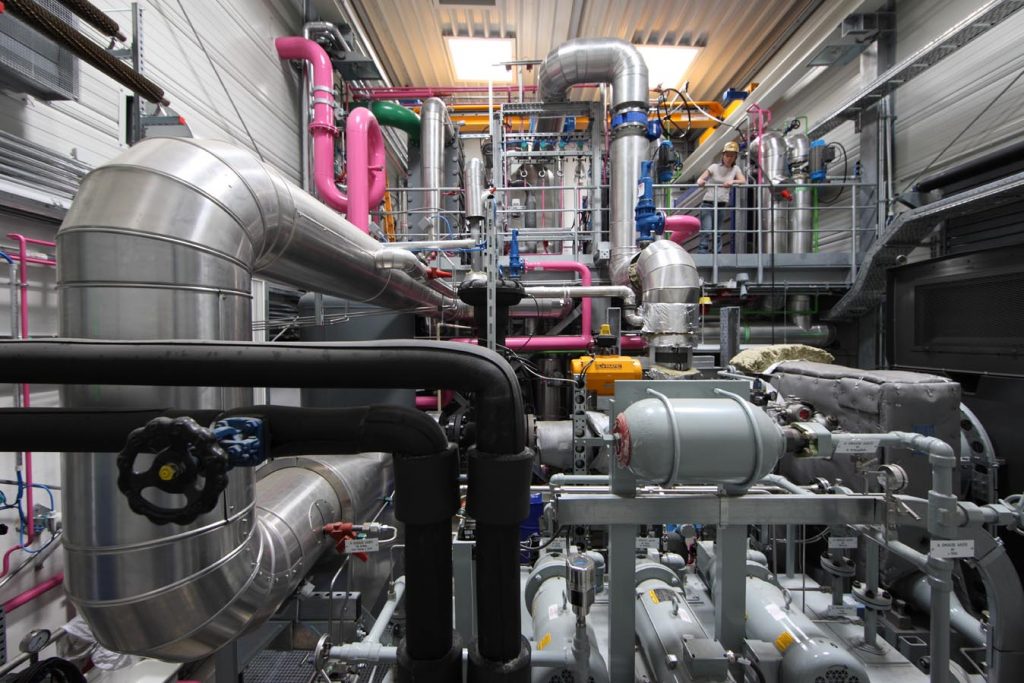Lithium for batteries from the Upper Rhine Graben’s geothermal resources
Under a joint project called UnLimited, partners EnBW, the Karlsruhe Institute of Technology, BESTEC, Hydrosion and the University of Göttingen will be working on a pilot-scale extraction of Lithium from geothermal brine in the Upper Rhine Graben in Germany.
The demand for lithium is increasing worldwide: The raw material is in great demand, especially for e-mobility. In order to be able to meet the increasing demand, the production of lithium from deep geothermal systems has been discussed for several years, and individual pilot projects are already being implemented – including in the Upper Rhine Rift. The German Federal Ministry for Economic Affairs and Energy is now funding the joint project UnLimited, in which EnBW Energie Baden-Württemberg AG, as cooperation leader, will set up a pilot system in the geothermal power plant in Bruchsal together with the Karlsruhe Institute of Technology (KIT) and the partners BESTEC, HYDROSION and the University of Göttingen.
Germany has so far covered its lithium requirements entirely through imports, but demand is steadily increasing as lithium-ion batteries are also in great demand for mobile and portable applications. All over the world, geothermal plants also show some considerable amounts of lithium in deep water – the question is how it can be extracted. The UnLimited project (“Investigations into lithium production from hot deep water in Germany”) aims to develop the necessary technical and economic basis for lithium production from hot deep water in Germany.
Domestic production opens up alternatives for supply chains
“The water drilled in Bruchsal is relatively rich in lithium with around 150 mg lithium per liter of water,” says Professor Jochen Kolb, head of the Geochemistry and Mineral Resources Department at the KIT Institute for Applied Geosciences. It will not deliver the amount required nationwide, but this domestic production opens up alternatives for supply chains and reduced environmental impact. “Short transport routes, flexibility compared to other providers, security of supply and extended supply chains: We use geothermal water as a raw material more efficiently,” says Kolb, “and that has the side effect that it could also give geothermal energy an economic boost.”
In the Bruchsal geothermal plant, which EnBW has been operating together with the Bruchsal municipal utilities since 2010, deep water for heat and electricity is pumped and returned to the reservoir after thermal use. With the water throughput, roughly 800 tonnes of lithium chloride are extracted and returned unused per year of operation. As part of a project, EnBW and KIT developed a process with which the lithium dissolved in deep water can be sustainably extracted on a laboratory scale.
“The laboratory tests make us optimistic. We have been able to prove that it is technically feasible in principle. Now the next step is to check the technical implementation under real conditions and to determine the profitability on a larger scale, ”emphasizes Dr. Thomas Kölbel, Group Geothermal Energy Expert at EnBW. “Our Bruchsal plant works in a closed cycle. This means that neither gases nor liquids are released into the environment. And now we want to show that we can also implement sustainable and environmentally friendly production on an industrial scale. ”
Efficient use of the lithium content in thermal waters
Previous studies show that there is increased lithium content in thermal waters in the North German Basin and the Upper Rhine Rift. The deep water, which is between 160 and 180 degrees Celsius, is drilled from layers between 3,000 and 5,000 meters deep and then passes through a heat exchanger. This is where the scientists come in – parallel to geothermal operation – and insert an ion sieve. “An economically viable extraction process offers the opportunity to improve the profitability of such systems,” says Kolb. In the laboratory, the processes run with around 85 to 95 percent efficiency, the aim is an efficiency in the real laboratory of around 70 percent.
In Bruchsal, lithium could be produced for 20,000 batteries
The aim is to extract lithium from geothermal water on a pilot scale at the end of the joint project while operating the plant at the same time. Around 30 to 70 liters of water are brought to the top in every geothermal system in the Upper Rhine Graben every second. “That would add up to the amount of lithium for a battery, for example, in around 40 minutes,” explains Kolb. “The amount for an e-bike in around two minutes.” With around 8,000 operating hours per year, the geothermal plant in Bruchsal could produce enough lithium to produce around 20,000 batteries.
“With an intensive reservoir analysis we want to prove the sustainability and thus also the economic efficiency of lithium extraction from the deep water together with the project partners”, explains Dr. Jochen Schneider, Managing Director of HYDROSION GmbH. “Another important point is the quality of the lithium and that no harmful waste gets into the environment.” Lithium production from a renewable energy source must meet the highest environmental standards and the public must be transparently informed about the process.
To estimate the lithium resource in the geological subsurface, it is essential to know the release processes for lithium in the geothermal reservoir and the size of the reservoir (volume captured by the circulation). To quantify the lithium load, the applied geoscientists at the University of Göttingen use methods that investigate the hydrogeochemical processes at the boundary between solid rock and circulating fluid. For this purpose, the distribution of the stable isotopes of lithium is used in particular.
The project costs are around EUR 3.4 million (around USD 3.1 million). The Federal Ministry for Economic Affairs and Energy is funding the UnLimited project with an amount of EUR 2.7 million.
Source: KIT, EnBW via our partner website TiefeGeothermie


















